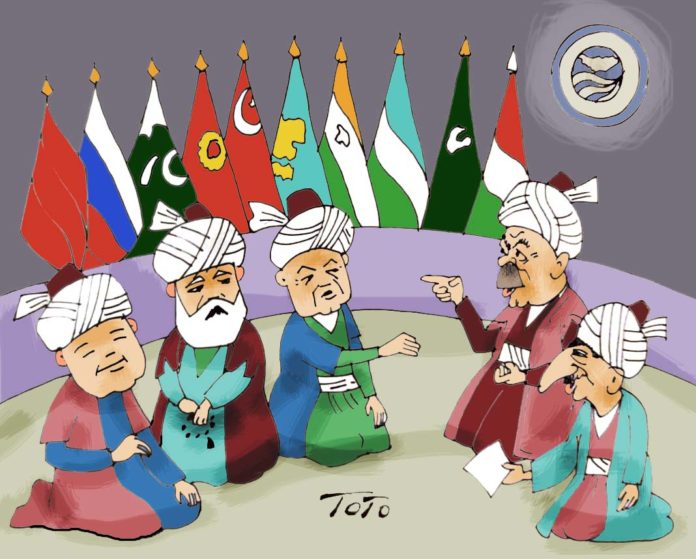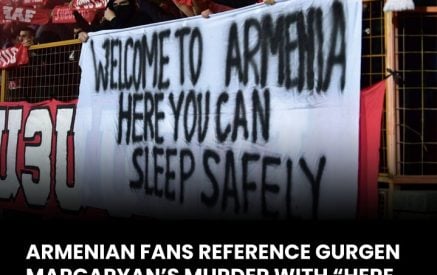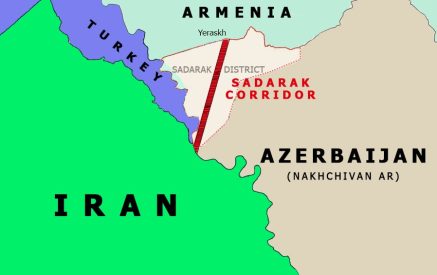by Edmond Y. Azadian
The city of Samarkand in Uzbekistan may be distant from Armenia, but it will shape its future, as it has in the past.
Samarkand has become the focus of the political world recently. On November 11, it hosted the ninth summit of the Organization of the Turkic States (OTS), with the participation of Turkey, Azerbaijan, Kazakhstan, Kyrgyzstan and Uzbekistan, with Turkmenistan and Hungary attending as observers.
Read also
One would ask why a European country would be present in the midst of all these Turkic nations. The answer is that Hungarians claim to be descendants of Magyar settlers, Huns and Turks — thus the brotherly ties. Perhaps that would explain Hungarian Prime Minister (and international neo-Nazi pariah) Viktor Orban’s gift to Baku when in 2012 he repatriated Azerbaijani officer Ramil Safarov, who was convicted of killing Armenian army Lt. Gurgen Margaryan in that country in 2004.
Mr. Orban also offered his country’s support to the summit, stating, “Our country supports the work of OTS and will work for the successful implementation of the Turkish vision in the next decade.”
Incidentally, if you need to know how out of touch the Armenian world is, the Armenian Catholic Patriarch Raphael Bedross XXI was in Budapest two weeks ago to present to Orban the Holy Cross Medal of Gratitude!
Kissing the Turkish overlord’s boots even further, the OTS also awarded observer status to the occupied northern Cyprus region (the unrecognized Turkish Republic of Northern Cyprus), triggering an angry rebuff from the European Union.
The summit received scant coverage in the Armenian media, despite the fact that the goings on there may have a serious bearing on Armenia’s future. Azerbaijan and Turkey were major players and Armenia’s destiny and particularly the issue of the “Zangezur Corridor” were conspicuously on the agenda. There was also a clear threat aimed at the territorial integrity of neighboring Iran.
The Turkic world or the Turanic empire, has survived more than a century as a vision of Turkey. The realization of that vision was postponed for a full century because of the emergence of the Soviet Union, which absorbed all the Turkic nations in Central Asia. Because of the atheism practiced in the Soviet republics, religion failed to serve as a cohesive factor, something Turkish leader Recep Tayyip Erdogan has learned the hard way. He has made futile attempts to open Islamic madrasas and mosques in those countries, after they emerged out of the rubble of the Soviet empire, all to no avail. That is why he turned instead to the issue of ethnicity, which seems to be working.
Over the centuries, when waves of Turkic hordes moved from Central Asia to the West, they trampled over all the civilizations in their path, including the Armenian and Byzantine ones. Ironically, Turkey is looking back to Central Asia to discover or create the Turkish civilization in Central Asia.
No wonder that President Erdogan attended the victory celebration in Azerbaijan on December 10, 2020, in Shushi, following the 44-Day War, and evoked the memory of Enver Pasha, stating that “we are back here to pursue the dreams of our ancestors.”
Indeed, Enver Pasha, after the collapse of the Ottoman Empire, fled to Central Asia to unite the Islamic nations and build a new one. He was a member of the Ittihadist triumvirate, along with Talaat and Jemal, who organized and perpetrated the Armenian Genocide.
After the Central Powers (Germany and the Ottoman Empire) were defeated in World War I, Ottoman military tribunals sentenced to death many war criminals in absentia. The leaders escaped the verdicts for a while, until the Armenian Nemesis group caught up with them and executed them one by one. Enver was the last one to fall victim to those avengers, in August 1922. Before him, Cemal (Jemal) was assassinated in the same year.
All those Islamist leaders turned to the Bolsheviks to save their necks. Cemal Pasha was in Russia when he met his destiny. Similarly, Enver Pasha had convinced Lenin to support him and allow him to travel south to quell a Basmachi revolt in Central Asia. (The revolt started out when the Red Army started drafting the local Muslim population.) But as soon as Enver arrived in Bukhara, instead of doing as he had promised Lenin, he joined the Basmachis to fight the Bolshevik rule. Thus, he became fair game for the Soviet regime, which chased him until the very end. In fact, a cavalry brigade of the Red Army, led by Armenian Yakov Melkumov (Hakob Melkumian) traced Enver and finally killed him.
After the collapse of the Soviet Union, the Turkish state claimed and received the remains of Enver Pasha in 1996 and reburied them at Abide-i Hürriyet (Monument of Liberty, in Sisli neighborhood of Istanbul).
During World War II, Turkey was cooperating with Nazi Germany and thus was able to retrieve Talaat’s remains in 1943 and bury them in Istanbul. (We all know Talaat was assassinated by Soghomon Tehlirian in Berlin.)
It was only Mustafa Kemal, a minor figure in the Ittihadist hierarchy who was able to dupe Lenin that he was fighting to build a socialist state in Turkey and thus receive arms, gold, food and political support to fight and deport Greeks and Armenians, who succeeded in laying down the foundations of the current Turkish Republic (1923).
Therefore, President Erdogan is following Enver Pasha’s footsteps when he undertakes to band together the Turkic nations of Central Asia to use them as a springboard for creating an empire to satisfy his global ambitions. No wonder he is criticizing the structure of the Security Council of the United Nations, claiming that the five major powers should not determine the fate of the rest of the world, and that there should be a place for nations like Turkey.
Turkey joined NATO to build up its armed forces and to attain a power beyond regional confines. As the bipolar world breaks up into a multipolar configuration, Turkey is seeing an opportunity to try its luck. For a long time, Ankara believe the road to achieve its imperial ambitions was through the European Union. Finding that gate shut tight, it has resorted to using the Turkic world, which may be a viable solution, since it has found some encouragement in the West. Indeed, Farida Musayeva writes on the website moderndiplomacy.eu, that “The meeting of the Council of Heads of State of the Organization of Turkic States Summit was held on November 11, 2022 in Samarkand amid increasingly frequent statements from the European Union and the United States America that the countries of Central Asia should get rid of the influence of the Russian Federation and the People’s Republic of China.”
This statement suggests that the West intends to fight its two major adversaries by creating a third power bloc. This begs the question as to whether President Nixon envisioned that today, the US would face China as a major adversary when he visited that nation in 1971, and the Nixon-Kissinger tandem aimed to split the Moscow-Beijing axis, and weaken the Soviet Union?
The OTS began as the Cooperation Council of Turkic Speaking States, founded by the 2009 Nakhichevan agreement, and later became an organization with more clearly defined political and economic goals. As of now, the military component does not feature on its agenda. However, given Turkey’s full participation on Azerbaijan’s side during the 44-Day War against Armenia, it does not leave any doubt that the leaders have the military aspect on their mind as well. The irony is that besides Turkey and Azerbaijan, the rest of Central Asian nations are Armenia’s allies in the Russian-led Collective Security Treaty Organization (CSTO). This did not stop them from congratulating Baku for its victory in its “patriotic war” as part of OTS’ Samarkand declaration.
Speaking at the summit, Azerbaijan’s leader Ilham Aliyev stated that the Turkic world covers a geography of more than 200 million people and has great economic potential. Assuming that Armenia’s territory is part of that Turkic world, he went further by claiming part of Iran as well. He stated: “I think that it is time for our organization to give importance to the issues such as the protection of the rights, security, and national identity of our cognates living outside the OTS member countries and preventing their assimilation.” Continuing in the same vein, Aliyev added, “The young generation of the Turkic world should have the opportunity to study their mother tongue in the countries of their residence. Unfortunately, the majority of the 40 million Azerbaijanis living outside Azerbaijan are deprived of these opportunities.”
This was a direct allusion to the segment of Iran’s population in the province of Azerbaijan, in the north of that country. Since tensions between Tehran and Baku had already been rising in recent weeks, a strong rebuke came from Iran’s parliament, referring to the Treaty of Gulistan of 1813 between Russia and Iran, stating that were it not for that treaty, Azerbaijan itself would have been included in the current territory of Iran.
Further expounding his ambitions, Aliyev added, “This week, the Azerbaijani people proudly celebrated the second anniversary of the liberation of Karabakh and Eastern Zangezur from Armenian occupation.”
He also indicated “during the occupation, Armenia destroyed 65 out of 67 mosques,” to inflame the ire of the Islamic world, never mind that many of the Azerbaijani religious groups languish in Aliyev’s prisons.
But most important of all, Aliyev brought up the “Zangezur Corridor” to the agenda of the OTS, stating, “The results of the Second Karabakh War create new opportunities for the region. Azerbaijan actively promotes the establishment of the Zangezur Corridor and carries out large-scale activities related to the corridor in its territory. All countries from the region will benefit from the opening of the Zangezur Corridor.”
Thus, he insinuated that the corridor is not only Azerbaijan’s plan but that it should be considered a cause célèbre for the entire Turkic world.
In Mr. Erdogan’s vision, the OTS is not only a regional organization but also one that should entertain and attain global ambitions. In his speech, Erdogan drew attention to the “global instabilities and problems” and he added, “It is important that we increase the visibility of our organization in the international arena,” referring to the steps taken by the OTS towards becoming a full-fledged international entity.
All these statements and plans indicate that the Armenian-Azerbaijani conflict is not just a regional one but rather one that has broader ramifications as its territory and the “Zangezur Corridor” have been placed on the butcher’s block of the entire Turkic world. Thus, Aliyev’s bellicosity and arrogance represent the top of the iceberg.
Armenia, therefore, has a bigger challenge than it can handle alone. While it can aspire to build its armed forces to deal with Azerbaijan’s incursions into its territory, on a broader scale, it has to build its foreign policy to find its niche within global developments where the expansion of the Turkic world crosses the interest of other opposing powers.


























































